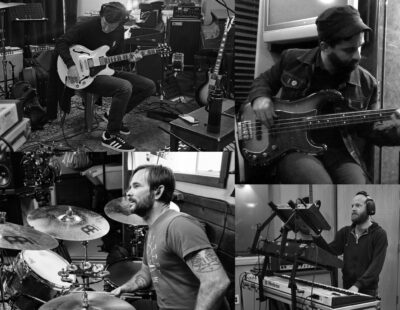Fight Amp’s Birth Control is the sort of super-cool genre non-specific releases that sounds like it was written in a week tops and thrashed out and tracked in a day. It sounds 100 per cent jam room live, heaping catchy riffs on top of awkward and dissonant hardcore punk and noise-rock. If it sounds unruly, well, that’s ‘cos there were on rules involved: It was just idea, riff, execution. But weirdly for something that sounds so instinctive and off-the-cuff, Birth Control is a concept record. As guitarist/vocalist Mike McGinnis reveals, making a concept record doesn’t mean you have to go overboard and anchor the album to any one genre, theme, idea or sound.
Birth Control sounds really live and gutsy—what was the recording process like?
Mike McGinnis: We’ve always done most of it live. I mean, obviously we go back and track extra guitars, vocals, and some fun feedback stuff, all that kind of stuff, but we’ve always tried to adhere to that Albini approach. Our strength definitely lies in our live set so we try to capture that as much as possible on the recorded—while still making it an ‘album’, putting album-orientated things on there.
Did you work with a producer?
Mike McGinnis: Actually, this is the first full-length that we have produced ourselves. The last two, Phillip Cope from Kylesa produced.
That seems logical, because Fight Amp come across as the sort of band who are so DIY that if it were possible you’d print the CDs in your garage.
Mike McGinnis: Yeah, absolutely! That’s where we come from. That’s the ethic we’ve always had and held onto, and honestly, the more you do yourself the more control you have over it. The more control we have the more things seem to go down the path we want them to.
Was it a case of trying to learn as much as possible from, say, working with Phillip so that you have the skills to go it alone?
Mike McGinnis: Yeah, that’s something we talked about. Working with him—I mean, honestly, I’d like to work with him again in the future; I’m definitely not ruling that out—on two different albums we learned a lot. We used our own theories and recording methods, the DIY ethic, and combined them with what we’d learned doing records with Phillip, and I think on this record we were really able to capture the best of both worlds in terms of production whilst still maintaining that live sound and everything. I think it paid off, all those bits and pieces we’d picked up from past recordings.
As a three-piece, it’s almost like everybody is a lead instrument; it must give you a lot of room to cut loose as musicians. Does it make it more fun, or easier to be more impulsive with fewer instruments to worry about?
Mike McGinnis: Yeah, honestly we had planned to be a three-piece for a while—and we’ve been a three-piece longer than we have been any other combination. We started with two guitars, a frontman, then we worked the frontman out of it, then we worked the second guitar out of it, and honestly the only reason we ever had a second guitar player was because good friends of ours kept offering to do it. But really our plan all along was to just have one guitar, and we just really grew into it; we look at the band and it’s three instruments, and each of those instruments is 33 per cent. We never try to hide any one aspect of it. I really feel that one of the things we were able to do was really let the drums and bass shine a lot more once we’d got rid of the second guitar—I always felt that was one of the strongest aspect of our music so why bury the bass, why bury the drums? It’s definitely a lot more fun, and as much as it might seem that it would limit some other bands it did the exact opposite for us; it actually opened up a lot of doors, like a less-is-more type of thing . . .
You play around with genres a lot—there’s metal in there with the hardcore and noise-rock: Do you feel that you could play anything because your sound isn’t really anchored anywhere?
Mike McGinnis: That’s always been the idea since we started. I mean, the first couple of years we were kinda rooted in punk/hardcore leanings, more than anything else, but we quickly started [to change]. The way we’ve always looked at it is whatever riffs come out is what we write—we’ve never tried to adhere to one genre and I honestly wouldn’t really be into playing in a band like that. It’s one of those things. We never look at writing the music as writing a style, it’s just whatever riffs pop into me or John’s heads. When I’m sitting having a cup of coffee or a beer, whatever, and I think of a riff and play it, it’s never because it sounds like one thing or another it’s just what pops into my head, and that’s always how it’s been and how it will be I think.
Where does the metal influence come from?
Mike McGinnis: We’re definitely all metal fans, for sure, but I would say I probably don’t spin metal records as much as I spin punk or noise-rock or even just classic rock, but I definitely spin metal records—we all do. I would say, honestly, early Metallica [laughs]; I know that sounds funny, but as far as pure metal goes that particular style of metal is what has stuck with me. As far as contemporary stuff, newer metal bands, there are so many genres it’s hard to hear what we are being influenced by but as far as the classic stuff is concerned, Ride the Lightning-era Metallica is something that every once in a while shines through.
Birth Control sounds a little catchier, with more hooks. Was this on purpose or did it just turn out that way?
Mike McGinnis: Y’know, the riffs are the riffs; the way we’ve always come up with riffs it’s just whatever comes to mind, but as far as putting the song structure together, definitely, it was a conscious thing to play more on the hooks than the bits between, the transitional sorta parts. It was absolutely a conscious decision to even write more simple song structures. Some of them are still a little bit complex; they’re not necessarily A-B-B-A or anything, but it was a conscious decision that if we had a catchy riff we’d come back to it multiple times in a song, and it’s good that you picked up on that because it is something that we did on purpose, for sure.
Is this drummer Dan Smith’s first album with you guys?
Mike McGinnis: Yes, the first time he played with us he was a fill-in for us last year. We did a national tour with Weedeater, Saviors and Bison B.C. and our last drummer was getting married and we had Dan fill in. When we got home, basically, it was just some personal stuff with our old drummer Mike Howard, and Dan worked really well on the tour; we were like, ‘Why don’t you just keep playing with us?’ And he was really into it, and was in a position where he could and he wanted to.
And he did the cover art, too, right?
Mike McGinnis: He did the cover art, the whole layout. He has been an artist for a while; that’s actually what he had been doing full-time, more than he was doing music.
So Birth Control is a concept record?
Mike McGinnis: It is, but it’s loose. A lot of bands will do a concept album and it’s really based strongly ’round fiction or fantasy and we kinda combined the two. We created a character that grows from his adolescence in the first song, to his death in the last, and a lot of the ideas and experiences that he goes through . . . I mean he goes through things that people we know have done, or we ourselves have gone through. It’s all based on real experiences and, definitely, on the second half of the record the world ends and—obviously that is fiction—a lot of the things he thinks and does are based on what we would think a person of that nature would do. It’s a concept but it’s based on real things; like the first song, “Fly Trap”, that’s actually him going to Fly Trap, a house that we used to live in and play shows in, in South Jersey. We played basement shows there for years; it was this place where all the kids went to for a little while, and this [song] is our character rubbing shoulders with ourselves at the Fly Trap.
There is a definite narrative feel, but is there political subtext to the record?
Mike McGinnis: I would say that the majority of what we write is socio-political, not really on purpose but it’s just what comes out. Birth Control was the first one where we wrote out ideas ahead of time, and wrote out this narrative and filled in the blanks, but most of the ideas just come to us—I wouldn’t say that they are national or international politics but we are very socio-political people. We all pay attention to the world around us, and I think everyone is affected by socio-political issues. Actually, all those things are very personal, that’s why we say it’s socio-political because it’s not political on a grand scale.
Even the title Birth Control hints at a broader political theme—right now the issue is a hot debate, with white male politicians trying to make policy that governs a woman’s body.
Mike McGinnis: Yeah, it’s a jab at that, for sure, but that’s not all it is; it is open to a few different interpretations, and that’s one of them. It’s a jab at the conservatives quote/unquote war on woman, because that’s something that we obviously don’t support whatsoever, and it’s something that has to be stomped out, the war on woman.
Do you think that politics, particularly American politics, is seeing a triumph of idiocy, where reasoned debate has given way to courting people’s deep-seated prejudices?
Mike McGinnis: Like, do I think that right-wing conservatives are playing up to people’s prejudices? I think so. I think it is a conscious decision on there part. Obviously it’s very complex, but I think that prejudice is something that is, not always, but can be very primal, and when you appeal to someone’s base, primal needs you can win their vote, you can get them to influence policy. I don’t wanna get to deep into it but I do think it is based on corporate agendas, and is geared towards suiting corporations more than anything else, and if you can use people’s primal, base urges to influence that then why wouldn’t they? I absolutely think that it’s a conscious decision on the right wing’s part to do that.
Moving away from politics a little, do you think the amount of information and the way we are constantly digesting said information is making for a more cynical society, and as a result are we turning into a hyper-critical society?
Mike McGinnis: Yeah, absolutely right—it would be impossible for that not to happen. I mean, it is impossible to say; we live in the information age, and all you can really do is look at history, but I think it would be impossible in the age we live in, the information age . . . The Internet’s been around for a while but it’s in everyone’s pockets now, and that’s fairly new. I think that everybody is just bombarded, and has the ability to be critical, as much as possible.
Where are you guys based at the moment?
Mike McGinnis: That’s always a bit of a weird, grey area question for us. Two out of three of us live in Philadelphia, currently, but I mean, where we are from in New Jersey, and where Jon [DeHart] currently lives in New Jersey is just 20 minutes outside of Philly. We are all originally from New Jersey but Philadelphia has always been our city. It has always been right there in the background.
You might be close to Philly but given how you’re kinda homegrown out of your own Jersey scene, has that made it easier for you to just do your own thing music-wise without fitting into a particular scene?
Mike McGinnis: We’ve always tried to embrace it. Two out of three of us live in the city, still, but we say we are from New Jersey. It always comes down to . . . Well, New Jersey is a pretty weird place is what it comes down to [laughs]. We always have tried to embrace the weird, but then we’ve always fed off the city.
What’s so weird about New Jersey?
Mike McGinnis: Most of the pop culture—like The Sopranos and Desperate Housewives—is based on New Jersey is based on the north, the New York side of things. New Jersey is nestled in between New York and Philadelphia, and we’ve always been more to the south, the Philly side. As far as south Jersey goes it’s a little more rural; there’s a lot more farmland. It’s a lot more wooded. I grew up in a house where the entire block behind me was the woods. I grew up swimming in the creeks, fishing, building tree forts . . . Spending a lot of time in the woods, basically, but I don’t know if that’s necessarily weird but New Jersey is a weird place with a lot of history as one of the Thirteen Colonies. You can look this up if you’re interested; there’s a magazine called Weird New Jersey that showcases some of the strange sights and strange people in New Jersey. It’s actually a pretty cool publication.
Yeah, because looking at your press shots, you’re totally out there in the great outdoors . . . There is more New Jersey than there is of you in the pics.
Mike McGinnis: [Laughs] Yeah, we did that on purpose! That is part of us embracing the New Jersey aspect of it. A lot of those press pictures are funny; like that one of us in a field, that’s actually a farm right behind where Jon and I grew up.
Well at least The X-Files put you on the map with the Jersey Devil episode.
Mike McGinnis: It’s funny a lot of people don’t know what the Jersey Devil is. We grew up with that, that was one of the urban legends that was engrained in us—I can’t remember not knowing what the Jersey Devil is. My parents told me about that when I was six years old, and as a kid you maybe don’t totally believe it but it’s there at the back of your mind that the Jersey Devil might be out there lurking around in your backyard. I think urban legends are a great community thing that people can feed off. That’s what your childhood should be like, with an element of magic involved. That’s one of the things about the age we live in now; nothing’s magical anymore, everything is proven fact or fiction.
FIGHT AMP:
Guitar/vocals: Mike McGinnis
Bass/vocals: Jon Dehart
Drums: Dan Smith
**Order Birth Control HERE!**
**Fight Amp on Facebook**
**Fight Amp on Bandcamp**
You can listen to Birth Control on the Bandcamp page, but here’s some dude saying why it rules:
https://youtu.be/NE-L4BiS1uY






